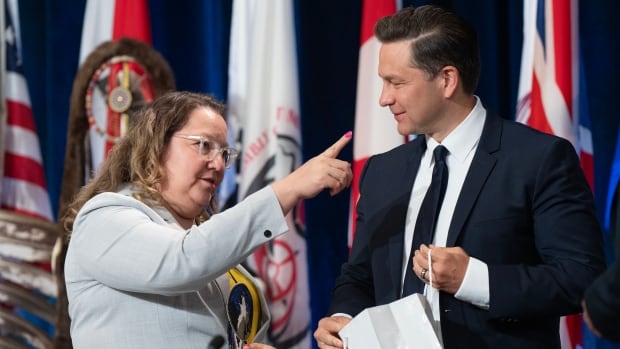The head of the Assembly of First Nations (AFN) is urging chiefs to back a multibillion-dollar child welfare reform agreement to get it in place before the next election, questioning whether a Conservative government would top it.
“Time is running out on this government,” National Chief Cindy Woodhouse Nepinak told First Nations leaders on Wednesday in Calgary, referring to Prime Minister Justin Trudeau’s Liberal minority.
“You don’t have to be a political scientist to figure out that there’s a good chance we will be dealing with a different government sooner than later.”
The AFN is hosting a special three-day meeting in a bid to secure national support for a 10-year, $47.8 billion child and family services reform agreement reached with Canada in July. The AFN advocates for more than 630 chiefs from across the country.
Woodhouse Nepinak said she has worked hard to reach out to Conservative Leader Pierre Poilievre since her December 2023 election and expressed optimism they could find some common ground.
“But we are not at the stage where I can stand before you as national chief and guarantee that we can get a better deal with the Conservative administration. If you tell me to go back, I will certainly try,” Woodhouse Nepinak added.
“What the Conservative leader has said is he won’t cut into the programs that are already in place for Canadians. Based on that, I say let’s get this program in place before the next election.”
In response, Poilievre’s office provided a statement from Jamie Schmale, Conservative critic for Crown-Indigenous Relations.
“Common sense Conservatives believe in the path to reconciliation, we support the implementation of Jordan’s Principle, and we support a redress of past injustices and discrimination in child services,” the statement reads.
“Indigenous children should have the same rights and access to services and opportunities as every other Canadian child.”
The statement went on to say Conservatives “will support Indigenous-led initiatives as a step to address injustices and contribute to the reconciliation process,” but it did not address the proposed agreement directly or say what the Conservatives would do with it.
The agreement aims to reform more than three decades of discriminatory Canadian child welfare policies which led to more First Nations children being taken into government custody than at the height of the residential school system.
It would also end a contentious 17-year-old legal battle at the Canadian Human Rights Tribunal over the government’s chronic underfunding of child and family services on-reserve.
Ontario chiefs voted to endorse the proposal last week despite concerns the deal may be imperfect and the consultations rushed, setting the stage for the national debate.
‘Where is Canada?’
Concerns continued to surface as the Calgary assembly opened.
The Squamish Nation in British Columbia on Wednesday released a pair of letters to the national chief and federal Canadian leaders expressing concerns about the agreement.
“We are deeply worried about its potential to perpetuate systemic discrimination and its failure to address longstanding issues within the child welfare system,” the nation said in a news release.
Squamish Nation Council Chairperson Khelsilem, the author of the letters, said in a post on social media the nation has yet to receive a response.
Cindy Blackstock, executive director of the First Nations Child and Family Caring Society, has voiced similar concerns.
Blackstock has been part of the tribunal proceedings since 2007 along with AFN, yet she is recommending against the proposed settlement agreement.
Among other things, Blackstock cited a clause in the agreement that requires the “co-operation” of First Nations signatories — AFN, Chiefs of Ontario and Nishnawbe Aski Nation — to secure chiefs’ support.
“What has been really a big question in my mind is where is Canada?” Blackstock said in a Tuesday interview.
“Canada is the one who discriminated against our kids, and Canada is the one that owes First Nations a duty to consult. They’ve done neither. They’re disappearing in the background and they’re leading AFN out there to do this piece.”
CBC Indigenous has contacted Indigenous Services Minister Patty Hajdu’s office for a response to these concerns.
In the first round of debate on Wednesday, multiple delegates argued the assembly’s agenda was biased in favour of the parties that have already agreed to promote the agreement. The agenda was eventually passed with amendments.
In the afternoon, delegates heard alternating passionate speeches of support and concern, with representatives from AFN, Chiefs of Ontario and Nishnawbe Aski Nation touting the agreement’s strengths and members of Blackstock’s Caring Society emphasizing areas of concern.
Mary Teegee, a Caring Society board member and executive director of Carrier Sekani Family Services, told chiefs “we can do better” than the current offer.
André Bear, a former child in care who is now a Caring Society board member, demanded a more transparent and inclusive process, calling the decision one that can’t be made behind closed doors.
“Don’t get me wrong, this is a good start. But I don’t trust Canada and I personally don’t trust the AFN,” he said to applause.
“We need the [Canadian Human Rights Tribunal] to remain involved in this agreement.”
Maggie Wente, lawyer for Chiefs of Ontario, said there is very little chance Canada will get a mandate to negotiate this deal.
Julian Falconer, lawyer for Nishnawbe Aski Nation, said he can go to court to enforce the agreement against a future government but scoffed at the idea of negotiating a better deal with the Conservatives.
“As a negotiator, the idea of sitting in a room with a Poilievre government and trying to get you this kind of agreement, it’s off the charts speculative, fanciful, and I have marshland in Florida to sell you. It’s not going to happen, respectfully,” he said.
The chiefs face competing resolutions — one to endorse the reform deal, one to reject it until changes are made, and one to delay the decision for 90 days.
The assembly is scheduled to debate and vote on resolutions Thursday before the meeting ends on Friday.


